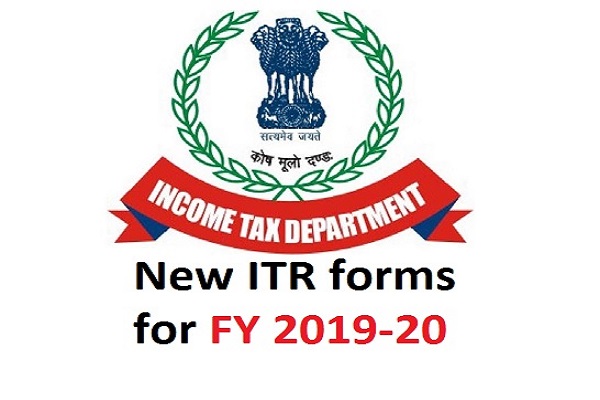Incorporating some key changes in the income tax return forms, the income tax department has notified ITR forms for Financial Year 2019-20 (Assessment Year 2020-21). In a notification, the finance ministry issued ITR 1 (Sahaj), ITR 2, ITR 3, ITR 4 (Sugam), ITR 5, ITR 6, ITR 7 and ITR-V forms. But till today, 01 June 2020, the ITR forms for FY 2019-20 (AY 2020-21) is not yet made available to Income Tax website.
The income tax department had earlier withdrawn ITR form 1 and ITR form 4 to incorporate changes made in income tax rules in the wake of the Covid pandemic. The new forms require a separate table to disclose tax saving investment made in Quarter-1 of year 2020 for availing them in FY 2019-20. Taxpayers must assess their tax liability for FY 2019-20 and make sure they are maximising their Section 80C benefits if not already done so.
(Also read: Reduction in TDS rates and Extension of due dates of ITR and Tax Audit)
Which ITR form is meant for you?
- ITR 1 form (Sahaj): This form is for individuals being a resident (other than not ordinarily resident) having total income upto Rs 50 lakh, having Income from salaries, one house property, other sources (Interest etc.), and agricultural income up to Rs 5000 (Not for an individual who is either a director in a company or has invested in unlisted equity shares).
- ITR 2 form: For individuals and HUFs not having income from profits and gains of business or profession.
- ITR 3 form: For individuals and HUFs having income from profits and gains of business or profession.
- ITR 4 form (Sugam): For individuals, HUFs and firms (other than LLP) having total income upto ₹50 lakh and having income from business and profession which is computed under sections 44AD, 44ADA or 44AE. Individuals who are either director in a company or have invested in unlisted equity shares are barred from using this form to file ITR.
- ITR 5 form: For persons other than individual, HUF, company and person filing ITR 7 form.
- ITR 6 form: For companies other than companies claiming exemption under section 11.
- ITR 7 form: For persons including companies required to furnish return under sections 139(4A) or 139(4B) or 139(4C) or 139(4D) only.
(Also read: Free Instant PAN through Aadhaar based e-KYC launched by Finance Minister)
Changes in ITR forms for FY 2019-20 (AY 2020-21):
- In ITR-1, Government employees have been bifurcated in State, Central Government and a new type as “NA” added to the list.
- If you have taxable income as dividend from domestic companies, you are not eligible to file ITR-1 form.
- Those with joint ownership of a house property cannot file ITR-1 or ITR-4.
- Taxpayers need to answer the following questions related to deposits in current accounts, foreign travel and electricity bills in all the ITR forms:
- “Have you deposited an amount or aggregate of amounts exceeding Rs. 1 Crore in one or more current account during the previous year?"
- “Have you incurred expenditure of an amount or aggregate of amount exceeding Rs. 2 lakhs for travel to a foreign country for yourself or for any other person?"
- “Have you incurred expenditure of amount or aggregate of amount exceeding Rs. 1 lakh on consumption of electricity during the previous year?"
- The income tax department has allowed taxpayers the laxity of making certain tax saving investments for FY 2019-20 till 30th June 2020 in view of the coronavirus lockdown. Deductions under Chapter-VIA-B of IT Act which includes Section 80C (LIC, PPF, NSC, etc), 80D (medi-claim) and 80G (donations) will now be allowed for spending till June 30th. The dates for making investment, construction or purchase for claiming roll over benefit in respect of capital gains under sections 54 to section 54GB has also been extended to June 30.
Finance Minister Nirmala Sitharaman had recently extended the last date for filing of all ITRs for FY 2019-20 to November 30, 2020 due to the lockdown. Earlier, individuals and other non-corporate taxpayers not subject to tax audit or transfer pricing are required to file ITR by July 31.
(Also read: Guidelines to be effective from 1st June 2020 for Phased Re-opening (Unlock 1))
(Also read: ICAI launches new website to deal Disciplinary Mechanism of CAs)
(Also read: Guidelines for Train Services beginning on 1st June 2020)

